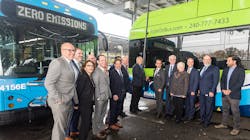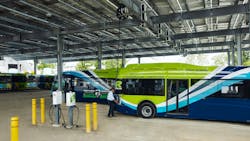Brookville Smart Energy Depot opens as largest bus microgrid and charging infrastructure project in the U.S.
Montgomery County, Md., took a big step toward its goal of transitioning its entire fleet to zero-carbon emissions by 2035 with the opening of the Brookville Smart Energy Depot on Oct. 31.
The depot in Silver Spring, Md., is the largest solar bus charging infrastructure project in the United States and will supply renewable energy to the County Department of Transportation’s (MCDOT) growing Ride On electric bus fleet.
“This project has been garnering attention nationally because it is innovative, groundbreaking, and will help us achieve our ambitious climate action plan to reduce all carbon emissions by 2035,” said Montgomery County Executive Marc Elrich. “Transportation is one of the largest contributors to greenhouse gas. We are leading by example by going emission-free. We are the third nationally to have solar-powered charging stations for our buses, and we are the largest so far.”
The Brookville Smart Energy Depot includes solar panels that are installed on tall canopies with charging stations, onsite battery storage, and backup generation. The 6.5 MW microgrid and electric bus charging infrastructure project will provide clean, renewable energy to charge up to 70 electric buses by 2026 with ample electric storage. The county currently has 14 electric buses and will be purchasing additional buses once a new procurement contract for up to 100 buses is complete early next year. Federal funds were used to purchase the first four electric buses. The depot will meet the full charging capacity of the depot, 70 electric buses, by 2026.
The county says transitioning 70 buses from diesel to electric, powered by the on-site clean energy microgrid, will reduce lifetime emissions by 62 percent, equivalent to more than 160,000 tons of greenhouse gas reduction during the next 25 years.
“The Brookville Solar Project ensures uninterrupted bus services during any long-term power outages caused by severe weather, as well as any short-term disturbances of the utility grid,” said County Council President Albornoz. “With global warming and our increase in aggressive weather events, building for resiliency is so important. Many of our residents are dependent on our public transportation system for essential trips, and we’re helping to ensure its reliability.”
Project delivered with partnerships
The Brookville Smart Energy Depot was completed through a partnership between the county’s Department of General Services (DGS) and AlphaStruxure. It is the third microgrid in the U.S. that will use solar power to charge buses for public transportation.
“This is the third microgrid project undertaken by Montgomery County, but the one that will have the greatest impact on county residents," said DGS Director David Dise. “Reducing the county’s dependence on fossil fuels is vital to our future. Equally vital is ensuring public facilities are resilient to the unpredictable impacts of climate and infrastructure degradation. This project is a model of successfully addressing both challenges, and we did it through a public-private partnership at no upfront cost to taxpayers.”
Juan Macias, CEO of AlphaStruxure, added the project “serves as a national model for municipalities and private fleet owners across the county.”
The project also utilizes The Mobility House’s smart charging and energy management system, ChargePilot, to coordinate charging with the microgrid’s 4.14 MW charging capacity to ensure vehicle readiness for the next day’s routes.
“The Brookville Smart Energy Bus Depot is a momentous achievement not only for resilient public transportation, but also in demonstrating the power of integrated technologies to provide sustainable community resources,” said The Mobility House U.S. Managing Director Gregor Hintler. “Managing EV charging within a microgrid is a technological achievement, and we are proud to offer our ChargePilot system as the link between onsite renewable energy generation and EV consumption.”
Arup also provided services for the project, including microgrid electrical design, site civil engineering for stormwater compliance and permitting, structural and geotechnical engineering to support equipment on the constrained site, plumbing engineering for generator connections, microgrid power studies, and utility coordination, including interconnection agreements.
“Tackling transportation emissions makes up a significant portion of Montgomery County's bold climate action,” said Arup Associate Sustainability Consultant Linda Toth. By opening this pioneering transit center and microgrid, the county with AlphaStruxure is embarking to make a real impact while signaling future opportunities for cities across the United States.”
About the Author

Mischa Wanek-Libman
Group Editorial Director
Mischa Wanek-Libman is director of communications with Transdev North America. She has more than 20 years of experience working in the transportation industry covering construction projects, engineering challenges, transit and rail operations and best practices.
Wanek-Libman has held top editorial positions at freight rail and public transportation business-to-business publications including as editor-in-chief and editorial director of Mass Transit from 2018-2024. She has been recognized for editorial excellence through her individual work, as well as for collaborative content.
She is an active member of the American Public Transportation Association's Marketing and Communications Committee and served 14 years as a Board Observer on the National Railroad Construction and Maintenance Association (NRC) Board of Directors.
She is a graduate of Drake University in Des Moines, Iowa, where she earned a Bachelor of Arts degree in Journalism and Mass Communication.

